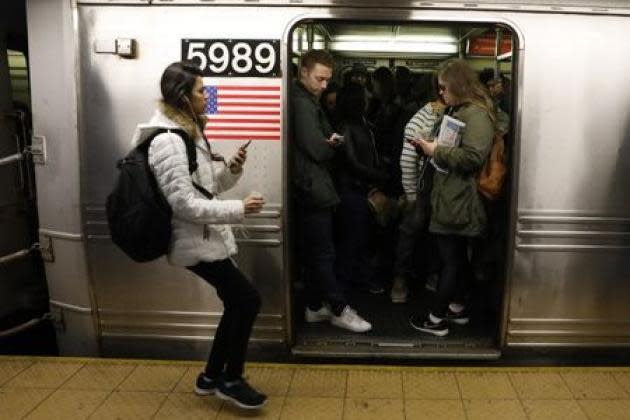New York governor gives extra $1 billion to 'decaying' transit system

By Jonathan Allen
NEW YORK (Reuters) - New York Governor Andrew Cuomo on Thursday announced an extra $1 billion to repair the state's "decaying" public transportation system and loosened environmental regulations and other laws to help speed up the work.
Under its current capital program, the state's Metropolitan Transportation Authority is spending $32.5 billion between 2015 and 2019 to upgrade aging transit infrastructure, improve its communications with commuters, and replace or refurbish its more than 6,000 subway cars.
Nearly half of that spending is for the New York City subway system, with the remainder split between various commuter railroads, bus networks, bridges and tunnels that the MTA operates.
Only 63 percent of subway trains are on time so far in 2017, down from 85 percent six years ago, according to MTA data. Just this week, a subway derailment injured 34 people.
"The current state of decline is wholly unacceptable," Cuomo said in a speech at an MTA conference for transit experts. "We know the system is decaying, and we know it's happening rapidly."
The $1 billion comes in addition to $8.3 billion in state funding to the MTA's capital program announced last year. Other funding comes from New York City, the federal government and through the sale of bonds.
Cuomo also signed an executive order declaring a state of emergency for the MTA that suspended a number of procurement and environmental regulations for repairs to the system.
According to the order's text, the MTA no longer has to produce environmental impact reports, for example, nor certify that there has been no collusion in a contract bidding process nor pay contractors promptly if compliance with those laws delayed necessary improvements.
Alphonso David, the governor's chief legal counsel, said in a telephone interview that the suspension of these laws was "standard" in emergencies, pointing to similar provisions in recent emergency orders issued by the governor during winter storms. The order would expire in 30 days, but can be renewed as long as the system's disrepair remains an emergency, which could take weeks, months or years, David said.
Riders Alliance, an advocacy group for New York commuters, said $1 billion was welcome but not enough.
"The Governor has stopped ignoring the problem, which is a vital first step," John Raskin, the alliance's director, said in a statement. "Now he needs to produce a credible plan to fix the subway, and to put together the billions of dollars we will need to make it happen."
(Reporting by Jonathan Allen; Editing by Lisa Von Ahn and Andrew Hay)


